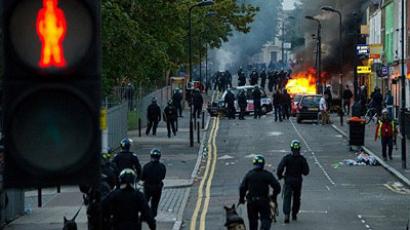Bin Laden’s ‘right-hand man’ to stay in UK: British govt loses appeal

The UK government has lost its appeal to deport radical Islamist preacher Abu Qatada to Jordan, a British court has ruled. Judges argued that Qatada could face an unfair trial based on evidence obtained through torture should he be extradited.
UK Home Secretary Theresa May had her appeal – filed against a
ruling protecting the extremist cleric from deportation dismissed
in the Court of Appeals.
May’s legal team disputed the Court’s judgment, arguing Qatada
was a “truly dangerous” individual who had evaded
deportation because of “errors in the law.”
As a consequence of the ruling, UK authorities will have to
release the preacher from custody just two weeks after his
arrest.The Metropolitan Police detained the cleric after they
seized a large amount of extremist propaganda material when they
raided Qatada’s north London home.
The UK Home Office vowed that this was “not the end of the
road,” and that they would work “to address the outstanding
legal issues preventing Abu Qatada’s deportation.”
The Special Immigration Appeals Commission (SIAC) ruled last November that Qatada could not be returned to Jordan where he is a convicted terrorist because he could face and unfair trial based on evidence obtained through torture.
The three judges presiding over the case said that although they recognized Qatada was a danger to British national security, SIAC’s legal principles were clear and well-established and had to be applied.
“The fact that he is considered to be dangerous is not relevant to the application of these principles any more than it would be relevant if the issue was whether he should be deported to a country where he would be at risk of facing torture himself," the appeal court ruling said.
Qatada has fought his extradition to Jordan for over a decade, dashing attempts by six different home secretaries to remove him. There is a slim chance that Home Secretary May could take the case to the Supreme Court and attempt to overturn the ruling.
The Islamist preacher was convicted in absentia on terror charges in April 1999, and was sentenced to life imprisonment in Jordan. If he were to return, he would face a retrial on these charges. SIAC believes that if a retrial were held, evidence obtained by the torture of Qatada’s two former codefendants, Abu Hawsher and Al-Hamasher, would be used against him.
Edward Fitzgerald QC argued in favor of the SIAC ruling, maintaining there was
"concrete and compelling evidence" that Qatada’s codefendants were tortured.
The opposition to the ruling against his deportation has argued that a
“fair” trial in Jordan could be guaranteed, and that the SIAC’s perception of the situation in Jordan is














